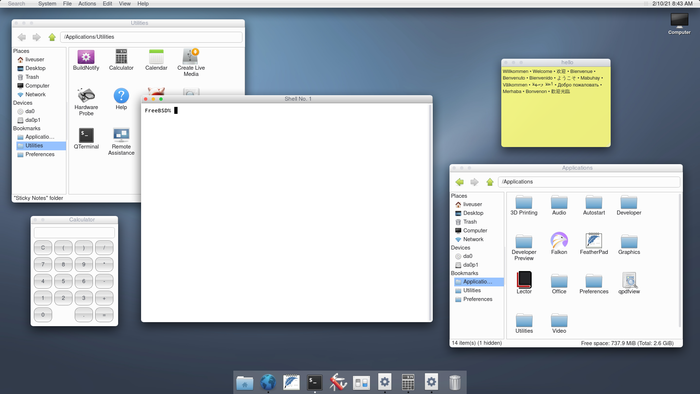Simon Peter ( Simon Peter ), creator of the AppImage self-contained package format , develops a new distribution helloSystem , based on FreeBSD and equipped with a macOS-like interface. The development of the system has not yet been completed, but for testing it is already boot images, 1.7 GB in size are being generated.
The distribution is developed in accordance with the principle of “less, but better” and is positioned as a system for ordinary users, to which macOS lovers who are unhappy with Apple’s policies, imposing solutions and vendor binding can switch. The system is free of the complications inherent in modern Linux distributions, is under complete user control and allows former macOS users to feel comfortable.
The interface is based on the idea of using the global menu. The panda-statusbar package developed by the CyberOS distribution kit (formerly PandaOS) is used to form the global menu and status bar. Application Panel Dock is based on the project cyber -dock , also from the CyberOS developers. To manage files and place shortcuts on the desktop, a file manager Filer is being developed, based on pcmanfm-qt from the Xfce project. The default browser is Falkon, but Chromium is available as an option.
ZFS is used as the main file system, and exFAT, NTFS, EXT4, HFS +, XFS and MTP are supported for mounting.
are shipped in self-contained packages. To launch applications, the launch utility is used, which finds the program and analyzes errors during execution. The system for building Live images is based on the toolkit from the FuryBSD project.
The project develops a series of its own applications, such as a configurator, an installer, a utility mountarchive for mounting archives into a FS tree, a utility for data recovery with ZFS, disk partitioning interface, network setting indicator, screenshot utility, Zeroconf server browser, volume indicator, utility for configuring the boot environment. For development, the Python language and the Qt library are used. Supported components for application development include PyQt, QML, Qt, KDE Frameworks, and GTK in decreasing order of preference.
